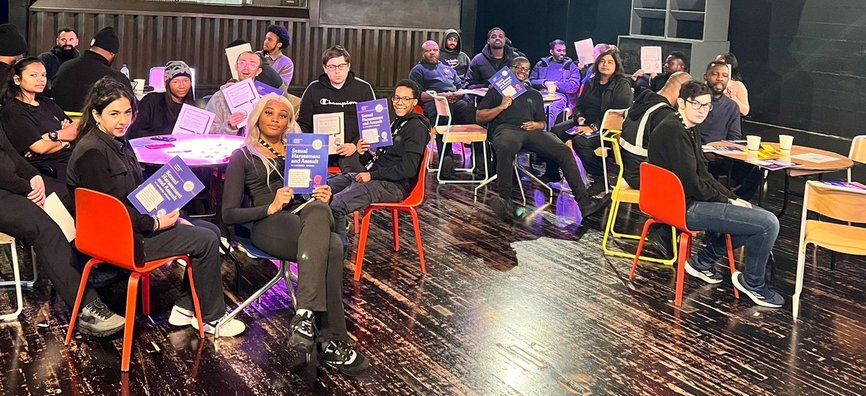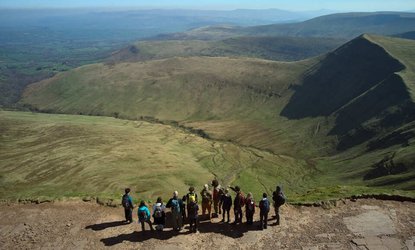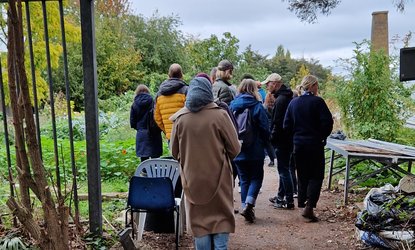In the second of our blogs on our roadmap for improving Our Natural World, Liam McAleese, Director of Our Natural World, shares what we’ve been doing to secure more money to finance nature’s recovery.
It has been estimated that a minimum of £43bn of private investment will be needed by 2030 just to meet existing Government targets on nature recovery in the UK. Even greater sums are needed if we are really going to get to grips with the climate and nature crises. It is an exciting agenda with huge potential, but there are also risks, perceived and actual. These range from a wild-west of dubious greenwash, to communities feeling disenfranchised from land use changes they feel are forced upon them.
We recognise the risks and the opportunities. We know that market based approaches and investment can be a force for good. Over the last 20 years, Esmée Fairbairn Foundation has played a key role in supporting the development of social investment in the UK. A key priority for our work to improve our natural world is to see where and how this experience can support the development of new models and markets for financing nature recovery – that are driven by environmental outcomes and sustainable business models rather than investor returns; and are led by, with and for communities, farmers, landowners and managers.
Developing a framework for action
We have seen in other policy areas, such as renewable energy, that a ‘long, loud and legal’ framework, as well as institutional architecture, are key to creating new markets and unlocking investment at scale. To this end, we have funded and participated in the emerging work by the Financing UK Nature Coalition to identify the nature equivalent. This is identifying barriers and recommendations on actions to help develop high integrity market mechanisms for nature recovery.
It’s clear that there are gaps in the policy, regulatory and institutional architecture required to ensure this integrity, and that some of this must be led by governments. Work is underway on this across the UK and is making progress. But we need a step change in ambition and scale. Experience in social investment shows the importance of governments making large interventions, such as the establishment of Big Society Capital 10 years ago. We need this thinking in financing nature right now.
We have supported work where we think we can help accelerate progress. For example, working with the IUCN to help support the development and use of the Peatland Carbon Code. We are also working with the Sustainable Soils Alliance, supporting their coordinating role on developing a Farm Soil Carbon Code. And we’re pleased to support our partners, FFCC, in developing models to support a transition to agroecological methods of farming, including through a proposed agroecology development bank. We are also keen to explore how the tax system can help incentivise investment, through mechanisms such as the Social Investment Tax Relief.
Practical projects to test new models
Frameworks are important, but there is also a need for action. We have supported pilot projects that have sought to test different models of financing nature. We initially undertook a review of the market and shared a report on emerging models for financing nature (an exercise we intend to repeat this year). We have been really pleased to work with Defra, the Environment Agency, Triodos Bank and a range of other partners to develop this work, and we held a webinar on innovative funding to restore nature to help share our collective learning. These pilots have helped inform the development of Defra’s Natural Environment Investment Readiness Fund and we are working closely with Defra, the Environment Agency and Triodos to share and disseminate learning from projects supported by this. We are exploring where and how we can support similar pilots in Scotland, Wales and Northern Ireland.
Improving the sector’s capacity and capability
As in the early days of social investment, a key issue is the capacity and capability of organisations to engage in new methods of financing. This is particularly the case with NGOs and some public bodies. So, we’re excited to support the development of GFI Hive from Green Finance Institute, and provide new support to the Ecosystem Knowledge Exchange Network and the Scottish Nature Finance Pioneers. These organisations are working together with governments and other partners to develop a UK wide network of practice to rapidly share learning from the range of projects that are happening. This network brings together governments, investors and practitioners in a way that can address practical barriers (such as model contracts or governance models) to more strategic issues, such as the need to develop standards. As part of this, we are working with partners to establish networks in Wales and Northern Ireland. We have also funded training and consultancy support to the sector and are looking at ways where we can increase this capacity building.
We are also using our social investment experience and are working with the Environmental Funders Network on a new Environmental Finance and Learning Fund. We hope it will increase the amount of high risk, early stage ‘pathfinder’ funding that will incentivise larger and institutional investment, as well as support funders to learn more about environmental investing. We are exploring how we invest in nature-based projects as an impact and mainstream investor.
Developing large scale initiatives
The message we hear repeatedly is that there is money out there to be invested, but few projects of sufficient scale to meet the needs of investors. Whilst pilots have a role in testing ideas, particularly in clarifying where and how revenues will be secured, we also need to do more to support and develop large scale initiatives. We have targeted support to projects and programmes that are working with local communities to develop large scale outcome-focused projects. Examples of this include the Great North Bog, Nature North, Riverwoods and National Parks Partnerships. We want to see more of these, particularly the development of large collaborative and multi-partner programmes.
Ensuring a just transition
All forms of funding nature recovery have their pros and cons – whether that is short-term public funding or philanthropic funding. There is growing concern around the rapid development of new models of private funding. These range from concern over corporate greenwash to people and communities being displaced. Some concerns are perceived, some are actual, but all must be taken account of. We will only support work where local communities and businesses are at the heart of decisions about the landscape around them, and want to ensure that the need for investment opportunities is understood by – and accessible – to communities (including in partnership with local authorities and national parks, who are moving into this space). We have commissioned Green Alliance to undertake some work on this.
Greening Finance
Finally, whilst this blog focuses our work on ‘Financing Green’, we are planning on being increasingly active on the “Greening Finance” agenda. We need to see fundamental change around how money is invested – few investors have any plans or commitments on biodiversity and influencing this is key to transformational change. We are pleased to be working with ShareAction on their emerging biodiversity programme, as well as the Charities Responsible Investment Network, and our own investment advisors to understand how we can use our endowment to help drive change. We are also considering how we increase ‘demand’ signals – including through advocating for nature positive corporate targets and reporting/disclosure.
What more can we do?
Feedback from partners suggest that more of the same from us would help. Please get in touch if you have ideas and opportunities to work together: liam@esmeefairbairn.org.uk.






